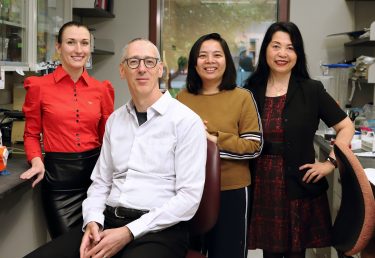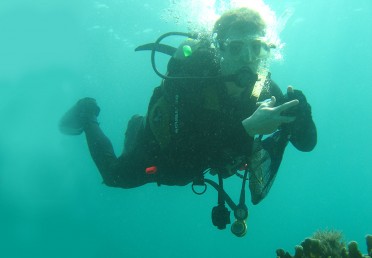Seven UIC researchers honored on ’40 under 40′ list
Seven UIC scientists have been recognized on Halo’s “40 under 40” list. They have been nominated and selected for their excellent work in translational research.
According to Halo, “these 40 scientists represent the next generation of big shoulder Chicago scientists working to translate innovation into application, from bench to bedside.”
Eleonora Gatta: The biological basis of alcoholism and addiction
“My research focuses on the long-term molecular adaptations induced by alcohol consumption in the brain. Stress has long been considered one of the mechanisms that contributes to both the development and the maintenance of alcohol use disorder,” said Gatta, postdoctoral research associate in psychiatry at the UIC College of Medicine.
Brian Murphy: Scuba diving for nature’s cures
“The focus of my research program is to discover antibiotics from bacteria collected in lakes and oceans. We have created an innovative platform which fuses classic microbiology with chemistry and computer programming to accomplish this, resulting in a discovery process that is more efficient. Since resistance to antibiotic therapies is a major threat to human health worldwide, our program fills an urgent public health need by enabling researchers to fill the drug development pipeline with new antibiotic leads,” said Murphy, associate professor of medicinal chemistry and pharmacognosy at the UIC College of Pharmacy.
Hien Ahn Nguyen: Cancer treatments cut from a safer cloth
“We use our core expertise in structure biology and rationale design to engineer out the undesired non-specific activity toxic to normal cells. Current biologics come from proteins foreign to the human body and trigger immune responses. We seek to replace those bacterial enzymes with less immunogenic enzymes,” said Nguyen, research assistant professor of biochemistry and molecular genetics at the College of Medicine.
Yuri Polikanov: Using X-ray crystallography to combat drug-resistant pathogens
“Our research is focused on elucidating the structure and functions of the ribosome, understanding the basic principles of protein synthesis in bacteria, the modes of action of ribosome-targeting antibiotics and mechanisms of drug resistance at a structural level. Our vision is that our research will facilitate the development of next-generation antimicrobial compounds, as well as clinical approaches to prevent the acquisition of drug resistance by clinical pathogens,” said Polikanov, assistant professor of biological sciences at the UIC College of Liberal Arts and Sciences.
Laura Sanchez: Finding clues to cancer metastasis in pheromones
“My lab takes inspiration for nature where microbes and animals can coordinate movement and actions using pheromones. Our technology and unique approach allows us to examine things like ovarian cancer from an entirely different viewpoint,” said Sanchez, assistant professor of medicinal chemistry and pharmacognosy at the UIC College of Pharmacy.

Amanda Schalk: A therapeutic to treat the most common childhood cancer
“Enzyme by Design is a pre-clinical protein engineering startup spun out from the University of Illinois at Chicago that focuses on developing innovative cancer therapeutics. Our biologics’ unique mechanism of action takes advantage of the weakness of a tumor’s metabolism while sparing healthy cells. Our focus is currently on developing a safer asparaginase, a therapeutic which is currently a mainstay in the treatment of acute lymphoblastic leukemia, the most common childhood cancer,” said Schalk, research assistant professor of biochemistry and molecular genetics at the UIC College of Medicine.
Rui Xiong: Hope for the 50% of breast cancer patients resistant to hormonal therapies
“The majority of breast cancer is estrogen receptor driven and is treatable with endocrine therapy; however, at least half of these cancers are refractory or develop resistance to therapy within five years, leaving these patients with only toxic chemotherapy. Two molecules from my research work are currently in phase 1/2 clinical trials and have the potential to become effective therapies for breast cancer patients in a few years,” said Xiong, research assistant professor of medicinal chemistry and pharmacognosy at the UIC College of Pharmacy.
Read more about the award recipients online.

